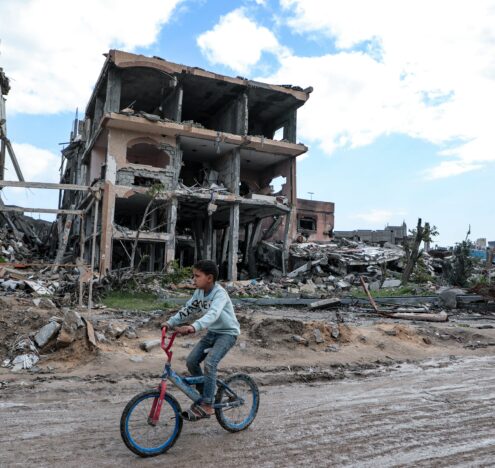The work of America’s diplomatic corps has always captivated me. Protecting American interests by traveling the world, living in foreign countries, and learning new languages is a fascinating way to serve one’s country. Growing up, military service never appealed to me, perhaps because I saw how it led to disastrous consequences in my parents’ birthplace: Afghanistan. After two decades of American military presence in Afghanistan, the country is even more unstable and dangerous than before. But while I believe in the power of diplomacy as a tool of foreign policy, the current conditions at the State Department have caused me, and many other Americans, to worry that we might be setting ourselves up for a frustrating career.
I began seriously considering a career in the State Department after I started my graduate studies in international affairs. I noticed early in my program that career service events were often tailored to students pursuing careers in the Department of Defense or in one of the nation’s intelligence agencies. Internship applications and job openings at these agencies were heavily promoted while similar opportunities at the State Department seemed nonexistent. I realized later that the exclusion of State opportunities was not a deliberate decision on the career services office’s part; rather, it signified a much broader issue existing in the national security field: the subordination of diplomatic tools in our foreign policy to military ones.
Part of my hesitation about joining the State Department is due to the recent experiences of some of its employees.
I recently picked up Elizabeth Shackleford’s book, “The Dissent Channel: American Diplomacy in a Dishonest Age.” In it, the former diplomat recounts the events surrounding the outbreak of the civil war in Juba, South Sudan in 2013, as well as the events leading up to her decision to publicly resign from the Foreign Service under Secretary of State Rex Tillerson. Her story is a firsthand account of the disconnect between diplomats on the ground and leadership in Washington, and how this “structural defect” can hinder the day-to-day work of diplomats and security personnel carrying out America’s foreign policies.
I realized later that the exclusion of State opportunities was not a deliberate decision on the career services office’s part; rather, it signified a much broader issue existing in the national security field: the subordination of diplomatic tools in our foreign policy to military ones.
It is also a critique of the hypocritical stance that drove many American foreign policy missions, long before Tillerson and President Trump. In South Sudan, this hypocrisy played out in the act of turning a blind eye to the atrocities committed by the newly independent South Sudanese government. As Shackleford notes, these atrocities — including the ethnic cleansing of the Nuer people by government forces — were based on “historic grievances that had been swept under the carpet with independence,” grievances that the United States and other partners were willing to ignore for the sake of upholding the US-South Sudan agenda. Though Shackleford resigned while Tillerson was in office, she explains that the insincere fashion in which US leadership “selectively invoked American values” predated the Trump administration for decades.
Earlier this summer, Shackleford was invited to a panel of like-minded foreign policy experts to discuss the launch of the Senate Foreign Relations Committee Democratic Staff’s report, titled “The Trump Administration’s Decimation of the Department of State,” where I learned more about her work. The contents of the report, commissioned by Senator Bob Menendez, are damning: more than one-third of Assistant Secretary or Under Secretary posts have been left vacant for years; more than half of Senate-confirmed positions were filled at least once by someone who had not been confirmed; and data from an Employee Viewpoint Survey shows that respondents belonging to one bureau reported that “they were considering leaving their job in the next year, rising from 13% in 2016 to 30% in 2019.”
Yet, despite Shackleford’s honest account of the failings of the US mission in South Sudan and the alarming findings of Senator Menendez’s report, I still find myself drawn to the mission and work of the Foreign Service and the State Department.
Believing that this “decimated” agency can be revitalized might sound idealistic, but it is not impossible. It would require our leaders to view defense and diplomacy as equally important assets to America’s foreign policy goals, which should be reflected in a more robust State Department budget and a leaner Pentagon budget. The president’s proposed budget for fiscal year 2021 allocated $740 billion to the Defense Department compared to just $44.1 billion to the State Department and the US Agency for International Development (USAID) combined. This would mean increases to the Pentagon’s budget for the sixth consecutive year, and deep cuts to the State Department and USAID for the fourth year in a row.
This stark imbalance in budget levels signifies the preference given to military tools over diplomatic tools in our national security agenda. Shackleford also touches upon this critical (and, in my opinion, key) issue undermining the agency: the militarization of US foreign policy. She calls the State Department’s starved budget relative to the military’s ever-expanding budget a cycle that only “reinforces itself.” Because the State Department lacks the funds and resources to carry out certain missions, the military is able to expand its activities, marginalizing the State Department even more.
Afghanistan is one landscape where the militarization of American foreign policy has unsuccessfully played out. After investing nearly two decades, more than $2 trillion, around 600,000 soldiers, and hundreds of thousands of arms, the United States finally considered the option of diplomacy. Talks between the US and the Taliban began in 2018 and a historic peace agreement was signed in February of this year. Secretary of State Pompeo attended the start of the intra-Afghan peace talks in Qatar last week. Yet, despite all of these recent diplomatic efforts, it is difficult to say if US leadership’s sudden embrace of diplomacy is a genuine effort to bring peace to Afghanistan, or if it is another example of Washington selectively invoking American values. Indeed, the February peace agreement that the US negotiated with the Taliban made no guarantees for women, minorities, or the protection of human rights.
Embracing the critical role that diplomacy plays in foreign policy would require less reliance on the most expensive military in the world, with 500 bases spread across 80 countries. Sustaining America’s military activities has led to the long-term neglect and defunding of other essential public services like housing, health care, education, and environmental protection. And most important, this massive spending on defense ultimately has not made America safer.
A stronger State Department is unfortunately not on the minds of most Americans. But revitalizing the agency, creating more opportunities for young people, and filling vacant posts is as important to American interests as military recruitment. And I would be remiss not to point out: true revitalization will mean making the path to the foreign and civil service in the State Department accessible to all Americans. The agency has suffered from deep inequality for decades. Today, around 81% of Foreign Service officers and 61% of Civil Service staff are white, while the percentage of women employees has slightly decreased.
America’s militarized foreign policy for the past two decades has had an effect on those of us that have grown up during this period: Gen Z and Millennial Americans are less likely than older generations to rank terrorism prevention and border strength as a top foreign policy priority, according to a study by the Center for American Progress. The study also finds that this group is “more supportive than older generations of prioritizing economic and diplomatic efforts rather than military action to achieve foreign policy goals.” As an Afghan American, my personal experiences are what led me to see the futility of US militarism in achieving foreign policy goals. But US militarism extends far beyond Afghanistan, and as the Center for American Progress survey shows, it has impacted the thinking of others in my generation as well. As more young people come to reject notions like American exceptionalism and US military domination, the US has an incentive to invest in diplomacy and in the State Department.
A glimmer of hope for a more just American foreign policy is expressed in the final pages of “The Dissent Channel,” and I share that hopefulness with Shackleford. We cannot simply return to the same hypocritical and often disastrous foreign policy agenda. But a combination of efforts this year — such as Senator Menendez’s report, as well as Congressman Joaquin Castro’s emphasis on these issues as he runs for Chair of the House Foreign Affairs Committee — could shine new light on the future of the agency and American foreign policy. These efforts, along with Shackleford herself, have at least succeeded in inspiring a Gen Zer like myself to take the Foreign Service Officer Test and accept an internship offer with a State Department office for the upcoming academic year.
Sara Bakhtiar is a Master of International Affairs candidate at Columbia University’s School of International and Public Affairs where she studies International Security Policy and Conflict Resolution. At Columbia, she is President of the Progressive Security Working Group and co-Vice President of the Columbia Public Policy Review. Sara is a 2020-2021 Foreign Language and Area Studies fellow.




















